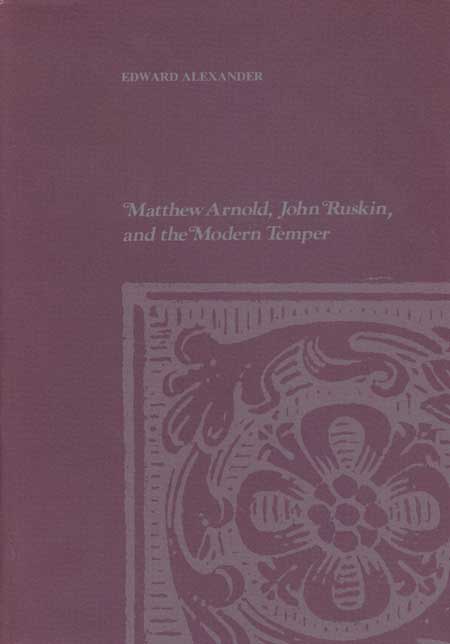| click here to read the complete text of the book | leave / read comments and critiques of the book |

Matthew Arnold, John Ruskin, and the Modern Temper
Edward Alexander
Like many of their contemporaries, Arnold and Ruskin faced the demand of the Victorian temper that art and learning subserve practical interest, and were torn between their inclinations as artists and their obligations as citizens. If it can be said that a man is “called” to the life of art, to the celebration of beauty, and, through that, to the discovery of truth, both of these great Victorians were. But a growing concern with social and political questions—first as they impinged upon the creation of art, but then for their own sakes—eventually diverted them into new activities that marked their entry into the public arena.
Skillfully interweaving the lives and writings of these two eminent Victorians, Professor Alexander clearly reveals how each grappled, often in highly productive ways, with intellectual and spiritual quandaries that again today beset large numbers of people who, though deeply involved in the cultural enterprise, have come to suspect that it has been discredited by the events of recent history. For just as it was in the Victorian period, the disinterested life of the mind is again called into question, not only by the Philistines and Jacobins, who have always been skeptical of its value, but also by some of those who, until recently, have been supposed to be both its paid practitioners and ardent advocates. Now as in the Victorian age many writers, having suddenly discovered that intellect is no guarantee of sanctity, question the utility of liberal education and scientific scholarship, and demand that art and learning subserve practical, political purposes.
Although Arnold and Ruskin moved in similar ways from art into society and politics, Ruskin saw no alternative to the immersion of his soul and sensibility in the miseries of the world that he wished to alleviate, whereas Arnold believed it was possible to discover some middle ground between involvement and detachment. Ruskin believed that one could not truly fathom the darkness and suffering of the world unless one participated in them emotionally and spiritually, but Arnold was certain that total involvement in the world‘s miseries, far from enabling one to see them clearly, deprived one of the perspective that came only with moral poise and intellectual distance.
Edward Alexander is professor of English at the University of Washington and the author of Matthew Arnold and John Stuart Mill (1965) and John Morley (1972), as well as articles on Mill, Carlyle, Lawrence, Dickens, and Bellow.
| 1973 310 pp. | This title is no longer available in a traditional print edition. Click here for free access to the book's full text. |

